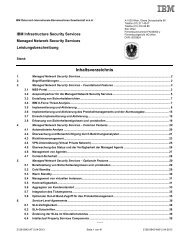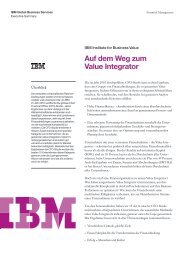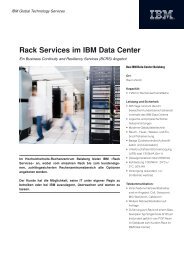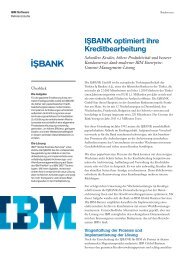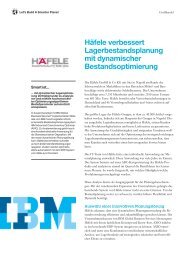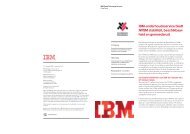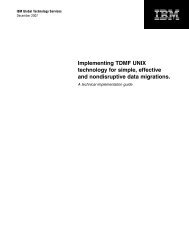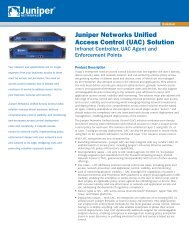A Strategic Guide For Local Government On: OUTSOURCING - IBM
A Strategic Guide For Local Government On: OUTSOURCING - IBM
A Strategic Guide For Local Government On: OUTSOURCING - IBM
Create successful ePaper yourself
Turn your PDF publications into a flip-book with our unique Google optimized e-Paper software.
A <strong>Strategic</strong> <strong>Guide</strong> for <strong>Local</strong> <strong>Government</strong> <strong>On</strong>:<br />
Outsourcing<br />
Managing <strong>Government</strong> Concerns<br />
about Outsourcing<br />
While local governments are realizing the benefits<br />
of outsourcing, important considerations<br />
keep organizations from quickly opting in.<br />
Worry over eliminating jobs, the desire to<br />
avoid costly moves and the fear of losing control<br />
of data are all frequently cited concerns. As<br />
discussed below, government organizations<br />
that have outsourced have had to address<br />
these same considerations.<br />
Worrying Over Eliminating Jobs<br />
<strong>On</strong>e of the reasons organizations opt to outsource<br />
is to contain unwanted costs. <strong>On</strong>e of<br />
the reasons not to outsource is the fear of<br />
eliminating jobs – positions that provide value<br />
to the organization. <strong>On</strong>e way to retain jobs<br />
while transitioning to outsourcing is to redeploy<br />
employees to other companies, transfer<br />
them to the outsourcer or free them up to<br />
focus on other needed functions within the<br />
organization.<br />
To ensure employees’ jobs are not eliminated<br />
when outsourcing, the organization can require<br />
the outsourcer to hire government employees<br />
as part of the contract. The city of Minneapolis<br />
required the outsourcer to hire its government<br />
employees for three years with full salary, benefits<br />
and tenure when the city outsourced its IT<br />
infrastructure. <strong>For</strong> the employees not transitioned<br />
to the vendor, the city reallocated them<br />
to other government areas.<br />
The Fear of Incurring High Costs<br />
Fear of high costs keeps some organizations<br />
from moving to outsourcing. The opposite is<br />
generally the reality. Investing the time to analyze<br />
the business and technical environment<br />
and build a case for change provides insight<br />
into whether outsourcing may or may not be<br />
the best alternative for the organization. The<br />
CIO in the city of Minneapolis had to demonstrate<br />
cost savings in its business case to the city<br />
council and mayor. The outsourced services<br />
could not increase costs over performing the<br />
services in house.<br />
Many agencies have found that even if the cost<br />
is the same as running the function in house,<br />
the ability to fix future outlays has value. <strong>For</strong> the<br />
city of Indianapolis and Marion County, Ind.,<br />
outsourcing is used to contain costs. Cost containment<br />
stabilizes technology costs, which<br />
otherwise could spiral out of control. <strong>For</strong><br />
example, if desktop management is outsourced,<br />
the contract specifies a time period<br />
and a finite cost for the service. Outsourcing<br />
provided the city of Chicago’s CIO a fixed, predictable<br />
cost over a period of five years.<br />
Predictability is welcome by CIOs, CFOs and<br />
other city or county executives.<br />
The Concern of Losing<br />
Control of Data<br />
Another reason jurisdictions avoid outsourcing<br />
is because they don’t want to move the public<br />
information and data off site. Visiting other cities<br />
helps in finding out what other cities are outsourcing.<br />
In addition, a clear understanding of<br />
laws and regulations helps to make informed<br />
decisions about data management.<br />
Outsourcing firms are generally able to offer<br />
the best rates when they manage customer<br />
data at their city’s data centers. These centers<br />
may run the operations of hundreds of other<br />
customers and offer both economies of scale<br />
and leading-edge skills. Some cities are reluctant<br />
to give up control and prefer that an outsourcer<br />
continue to manage operations in the<br />
cities’ facilities.<br />
Other governments are comfortable with the<br />
secure and reliable environments of high-quality<br />
vendors. As a result, they take advantage of<br />
cost savings by allowing their data to be managed<br />
at vendor facilities. In either case, vendors<br />
should be able to describe and demon-<br />
8<br />
strate the skills and processes used to assure<br />
data security, including the use of offshore<br />
resources used by themselves or their subcontractors.<br />
The city of Minneapolis would only outsource<br />
its data to a vendor located in the same state.<br />
While the city lost some ability to “touch” the<br />
data, the vendor provided back-up capabilities<br />
and redundancy – capabilities that did not exist<br />
before and significantly increased data integrity<br />
and public safety.




